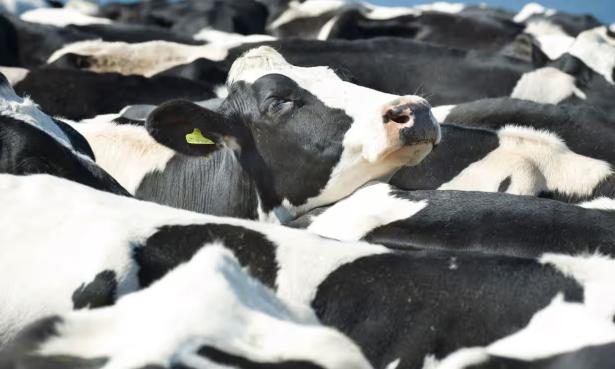Europe’s food and farming lobbies have recognised the need to eat less meat after hammering out a shared vision for the future of agriculture with green groups and other stakeholders.
The wide-ranging report calls for “urgent, ambitious and feasible” change in farm and food systems and acknowledges that Europeans eat more animal protein than scientists recommend. It says support is needed to rebalance diets toward plant-based proteins such as better education, stricter marketing and voluntary buyouts of farms in regions that intensively rear livestock.
The stakeholders also agreed on the need for a major rethink of subsidies, calling for a “just transition fund” to help farmers adopt sustainable practices, and targeted financial support to those who need it most.
The European Commission president, Ursula von der Leyen, who commissioned the report to quell furious farmer protests at the start of the year, said the results would feed into a planned vision for agriculture that she will present in the first 100 days of her new mandate.
“We share the same goal,” said Von der Leyen. “Only if farmers can live off their land will they invest in more sustainable practices. And only if we achieve our climate and environmental goals together will farmers be able to continue making a living.”
Animal agriculture is one of the biggest drivers of climate breakdown and the destruction of natural habitats, but European leaders have made little effort to steer diets heavy in meat and milk to whole grains and plant-based sources of protein. The report did not set targets for meat production, such as culling herds, but called for support to help shift dietary habits, such as free school meals, more detailed labels, and tax reductions on healthy and sustainable food products.
Agustín Reyna, the director general of the consumer group BEUC, said it wished the report’s recommendations on livestock and animal welfare were bolder but praised the overall vision as well-crafted and balanced. “Consumers are willing to play their part in the transition, yet they need a hand,” he said.
Copa and Cogeca, the biggest farming lobby in Brussels, appeared to question the findings around meat after publication of the report. It called for “swift and coherent actions” but asked for “vigilance” on the place of livestock farming.
The European Council of Young Farmers said the report did not always align with its narrative but praised the outcome of the dialogue as a welcome contrast from the atmosphere during the previous mandate and a solid basis for future work. “We are moving away from a methodology of defining objectives as high as possible for farmers to align with, to actually making steps into the transition in a collective and strategic way,” said its president, Peter Meedendorf.
The final report of the strategic dialogue on the future of EU agriculture, which was put together after seven months of negotiations, concluded with 16-hour days in Brussels last week as two dozen stakeholders went through the text line by line to sketch out a common vision. Its mandate was to enable conditions that let farming and nature protection go hand in hand.
Peter Strohschneider, who chaired the report and oversaw a similar process in Germany in 2021, said: “To put it bluntly, things have developed in such a way that all too often agricultural production and its natural preconditions have become entangled in a lose-lose constellation.”
The recommendations include reform of the common agriculture policy (CAP) subsidies, which makes up one-third of the EU’s entire budget and hands out money to farmers based on the size of their farm rather than their need for support.
Green groups and some scientists have criticised the scheme for prioritising meat production and incentivising environmental harm. In April, a study in the journal Nature Food found that the EU had made polluting diets “artificially cheap” by pumping four times more money into farming animals than growing plants.
Ariel Brunner, the director of Birdlife Europe, said it was encouraging to see that the farm lobby supported the need for change in the sector. “This is a victory for our farmers, our environment, and our future – if politicians will have the courage and integrity to act on it.”
The recommendations for reducing greenhouse gas pollution within farming focus on technological solutions such as new feed and better management of manure. The report also called on policymakers to define the agri-food sector as a “critical entity”, increase financial support for the sector and give it preferential treatment.
Scientists have criticised the political debate around farming and nature – which accompanied sometimes violent protests in European capitals – for being riddled with misinformation.
Marco Contiero, who leads agriculture policy at Greenpeace, said the negotiations started off “very polarised” but led to constructive engagement from almost all parties. He added: “If we are taken out of the usual state of confrontation – and unbalanced, unfounded statements – we see that we can agree on a large number of issues.”
Ajit Niranjan is the Guardian’s Europe environment correspondent


Spread the word